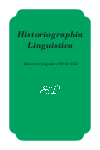
HISTORIOGRAPHIA LINGUISTICA
metrics 2024
Exploring the Nexus of Language and History
Introduction
HISTORIOGRAPHIA LINGUISTICA, published by John Benjamins Publishing Co, is a distinguished journal dedicated to the interdisciplinary study of language and history. With its ISSN 0302-5160 and E-ISSN 1569-9781, this journal has been an influential platform since 1974, and it is set to continue its valuable contributions to the field up until 2024. Based in the Netherlands, the journal explores the connections between linguistic and historiographical methodologies, fostering a dialogue among scholars in the realms of History and Language Studies. Notably, it holds a respectable impact factor, ranking in the third quartile for History and fourth for Linguistics and Language, as per the 2023 category quartiles. In the Scopus database, it ranks 589th out of 1760 in Arts and Humanities - History (66th percentile) and 508th out of 1088 in Arts and Humanities - Language and Linguistics (53rd percentile). HISTORIOGRAPHIA LINGUISTICA serves as a vital resource for researchers, professionals, and students, aiming to deepen their understanding of how linguistic perspectives can inform historical scholarship.
Metrics 2024
 0.11
0.11 0.20
0.20 0.20
0.20 13
13Metrics History
Rank 2024
Scopus
IF (Web Of Science)
JCI (Web Of Science)
Quartile History
Similar Journals

AEVUM-RASSEGNA DI SCIENZE STORICHE LINGUISTICHE E FILOLOGICHE
Exploring the Nexus of Language and Culture.AEVUM-RASSEGNA DI SCIENZE STORICHE LINGUISTICHE E FILOLOGICHE is a distinguished academic journal published by VITA PENSIERO, based in Italy, focusing on the intricate fields of historical linguistics, philology, and cultural studies. With ISSN 0001-9593 and E-ISSN 1827-787X, it has been a significant contributor to scholarly discourse since its inception in 1979, with publications dating from 2001 to 2020 and from 2022 to 2023. Although it is categorized in Quartile Q4 across various disciplines including History, Linguistics, Literature, and Philosophy for the year 2023, AEVUM serves as a vital platform for nurturing discourse and advancing research in its fields, particularly appealing to scholars and professionals seeking to explore the intersections of language and culture. While the journal is not open access, it continues to maintain academic rigor and relevance, encouraging contributions that reflect current trends and theoretical developments. Researchers and students alike can benefit from its rich repository of language and historical research, drawing connections that contribute to a profound understanding of human society through the lens of language.
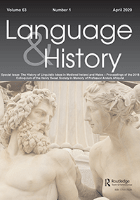
Language & History
Illuminating the Past Through the Lens of LanguageLanguage & History is a distinguished journal published by Routledge Journals, Taylor & Francis Ltd, focusing on the intersection of linguistics and historical context. With an ISSN of 1759-7536 and an E-ISSN of 1759-7544, this journal serves as a vital platform for scholars exploring the dynamic relationship between language evolution and historical narratives. It is recognized for its contributions to the field, holding a Q2 ranking in Linguistics and Language for 2023, reflecting its esteemed position among peer publications. Indexed in Scopus with notable rankings in both Arts and Humanities and Social Sciences, Language & History aims to foster innovative research, shed light on language change, and encourage cross-disciplinary dialogue. The journal operates without open access, providing rigorous peer-reviewed content for researchers, professionals, and students alike, ensuring that cutting-edge studies remain at the forefront of linguistic research. Published biannually, it continues to attract a diverse array of contributions that enrich the understanding of language within historical contexts, making it an essential resource in the academic community.

NEUPHILOLOGISCHE MITTEILUNGEN
Illuminating Contemporary Discussions in LanguageNEUPHILOLOGISCHE MITTEILUNGEN, published by the esteemed Modern Language Society, stands as a significant contribution to the domain of Language and Linguistics. With a history dating back to 1971, this journal has consistently provided an academic platform for researchers and scholars, navigating through the intricacies of philology and linguistic studies. Although it is indexed in Scopus with rankings reflecting its position in the Arts and Humanities and Social Sciences categories, it currently does not offer Open Access, which may require interested parties to seek institutional access for its wealth of content. The journal has experienced periods of coverage discontinuation in recent years, yet it remains a valued source for advancing the understanding of language theories and linguistic practices. Its location in Helsinki, Finland, offers a unique European perspective on global linguistic issues. The journal is ideal for those looking to engage with evolving linguistic trends and contribute to contemporary discussions in the field.

Verba-Anuario Galego de Filoloxia
Exploring Linguistic Landscapes: Where Research Meets TraditionVerba-Anuario Galego de Filoloxia is a prominent academic journal published by UNIV SANTIAGO COMPOSTELA, dedicated to advancing the field of linguistics and language studies. Hailing from Spain, this journal provides a vital platform for researchers, educators, and students interested in Galician philology and its broader linguistic implications. Although it operates under traditional access models, the journal’s commitment to quality research is reflected in its categorization within Q3 in Linguistics and Language for 2023, showcasing its significant contributions to the field. Encompassing a convergence period from 2017 to 2024, Verba garners attention in both the Arts and Humanities and Social Sciences domains, with its Scopus rankings highlighting its moderate impact within these categories. By nurturing scholarly dialogue and disseminating innovative studies, Verba-Anuario Galego de Filoloxia plays a crucial role in promoting linguistic research, making it an essential resource for professionals and academic institutions striving to explore the complexities of language and philology.

Rivista Italiana di Filosofia del Linguaggio
Innovating Perspectives on Language PhilosophyRivista Italiana di Filosofia del Linguaggio is a prominent academic journal dedicated to the exploration of linguistic philosophy and its intersections with various fields of study, such as linguistics, cognitive science, and semiotics. Published by UNIV STUDI CALABRIA, this journal seeks to foster scholarly discourse and critical analysis by providing a platform for innovative research and theoretical perspectives. With an expectation of rigorous peer review, the journal welcomes contributions that dissect the intricate relationship between language and thought, promoting a deeper understanding of linguistic phenomena. Although Rivista Italiana di Filosofia del Linguaggio operates under a traditional subscription model, its commitment to high-quality scholarship makes it a vital resource for researchers, professionals, and students alike who are engaged in the burgeoning field of linguistic philosophy. Based in Italy, and specifically located at CAMPUS ARCAVACATA, VIA PIETRO BUCCI, ARCAVACATA DI RENDE CS 87036, this journal continues to expand its international reach by attracting contributions from diverse academic backgrounds.
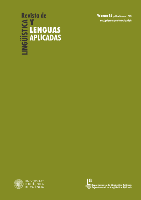
Revista de Linguistica y Lenguas Aplicadas
Exploring the Dynamics of Language and CommunicationRevista de Linguistica y Lenguas Aplicadas, an esteemed journal published by UNIV POLITECNICA VALENCIA, EDITORIAL UPV, is a pivotal resource in the field of linguistics and applied languages. Since its inception, the journal has embraced Open Access publishing since 2006, ensuring that its rich repository of research is readily available to a global audience of researchers, academics, and language professionals. Headquartered in Valencia, Spain, the journal contributes significantly to the advancement of linguistics knowledge, boasting a respectable ranking within the Q3 quartile for Linguistics and Language (2023) according to Scopus metrics. It covers a diverse range of topics and methodologies, engaging readers through its commitment to scholarly rigor and innovation. The journal is uniquely positioned to inform and inspire essential discussions from 2015 to 2024, making it a vital platform for emerging linguists and seasoned scholars alike, as they explore the evolving landscapes of language and communication.
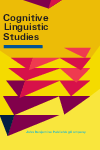
Cognitive Linguistic Studies
Bridging Minds: Where Language Meets CognitionCognitive Linguistic Studies is a prestigious journal published by JOHN BENJAMINS PUBLISHING CO, dedicated to advancing the interdisciplinary field of cognitive linguistics. With an ISSN of 2213-8722 and an E-ISSN of 2213-8730, the journal serves as an essential platform for the dissemination of high-quality research that delves into the intricate relationships between language, thought, and cultural contexts. Located in the vibrant academic milieu of the Netherlands, this journal has gained recognition for its impactful contributions, reflected in its respectable Q2 category ranking within the field of Linguistics and Language as of 2023. Redesigned to accommodate a broader audience, the journal welcomes original research articles, reviews, and theoretical discussions that bridge cognitive science and linguistic inquiry. As the journal continues its trajectory of growth, being indexed with a solid Scopus rank of #459 out of 1167 in the social sciences, it remains a vital resource for researchers, professionals, and students eager to explore the dynamic interplay between cognition and language.

Revista Argentina de Historiografia Linguistica
Elevating discourse on the history of language and thought.Revista Argentina de Historiografia Linguistica, an esteemed academic journal based in Argentina, is dedicated to advancing the field of linguistic historiography. Published by the REVISTA ARGENTINA HISTORIOGRAFIA LINGUISTICA-RAHL, this journal serves as a vital platform for researchers, professionals, and students interested in the study of language history and the evolution of linguistic thought. With a commitment to open access, it promotes widespread dissemination of knowledge, ensuring that valuable insights reach a global audience. The journal aims to publish high-quality, peer-reviewed articles that explore various dimensions of linguistics, including historical language development, sociolinguistics, and language policy. By engaging with a diverse array of topics and methodologies, Revista Argentina de Historiografia Linguistica not only enhances academic discourse within the linguistics community but also fosters interdisciplinary collaboration, making it indispensable for those seeking to deepen their understanding of linguistic heritage and its contemporary significance.

Jezikoslovlje
Bridging Theory and Application in Language StudiesJezikoslovlje, published by the Josip Juraj Strossmayer University, Faculty of Philosophy in Croatia, is an essential publication in the field of Linguistics and Language Studies. Launched in 2008 and extending its contributions to the academic community through 2024, this journal addresses a spectrum of linguistic research, facilitating scholarly dialogue around both theoretical and applied aspects of language. With a current Scopus ranking placing it in the 54th percentile in the Arts and Humanities and the 50th percentile in Social Sciences, Jezikoslovlje serves as a vital resource for researchers and students looking to engage with contemporary linguistic issues. Although it operates under a traditional access model, its indexed presence and rigorous peer-review process ensure that published works maintain a high scholarly standard, inviting contributions that advance understanding in this dynamic discipline. The journal's commitment to fostering knowledge in linguistics makes it a significant platform for academics in Croatia and beyond.
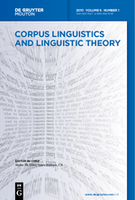
Corpus Linguistics and Linguistic Theory
Shaping the future of linguistics with data-driven research.Corpus Linguistics and Linguistic Theory, published by DE GRUYTER MOUTON, is a premier academic journal dedicated to advancing the interdisciplinary field of linguistics through the lens of corpus-based research methodologies. With an ISSN of 1613-7027 and E-ISSN 1613-7035, this journal is a valuable resource for linguists, researchers, and students who aim to investigate language structures, usage, and their theoretical implications. Recognized as a Q1 journal in the realm of Linguistics and Language, it boasts impressive Scopus rankings, positioning it within the top 7% and 8% of its categories in the Arts and Humanities and Social Sciences, respectively. Its relevance is underscored by a commitment to publishing rigorous research from 2005 to 2024, addressing contemporary advancements in linguistic theory fueled by empirical data. While the journal is not open access, it remains an essential platform for disseminating high-quality scholarship that informs both theoretical perspectives and practical applications in linguistics. As such, Corpus Linguistics and Linguistic Theory plays a crucial role in shaping the future of linguistic studies, making it indispensable for anyone engaged in this dynamic field.